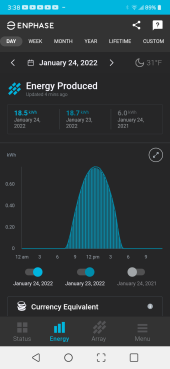Zwy
Solar Wizard
I just did
I think that $684/month is 11% cash flow on your net $5872 out of pocket, 6.8% on the $9472 including stimulus check (which you could have put in a frothy stock market or 0.01% passbook account.)
It should be $648/year which is 11.03%.
Put it in the stock market here and you could see it all gone a year from now.
In my case, I can fully fund my IRA's in equities/commodities and still have money left to put somewhere. Already have the toys (too many in fact) and need somewhere to go with it, inflation will eat it away.
If it lasts for ever, that cash flow percentage is as good as an interest rate.
If the system gets torn off your roof in a hurricane one year later, you're out 89% to 93% of your investment.
PV was the cheap part. My system is covered under my homeowner's policy, I'll get a new PV array if a tornado comes by and takes it out. No hurricanes here.
Unlike say a T-bill, you don't get principal returned in the end. So not all of that cash flow is same as interest. Over 20 years, you'll get 220% on out-of-pocket or 137% on the cash you could have had. You get the cash back plus 37% returned, 1.84% per year. Probably about what some interest bearing investments offer? Or maybe not right now. At times in the past decade I've received 2% +/- on 5 year CDs, but they're probably 1% today.
Let's say with batteries and a complete system payback is 10 years.
I think the return long term is much better that 2%, if that was all it returned, you can't get payback in 10 years. Rule of 72 applies, money doubling in 10 years is 7.2%, not counting inflation. That means at 20 years, you not only got your money all back but doubled the initial investment. That's 3.6%, not counting inflation and you still have a system that produces.
Your panels should last 25, maybe 40 years. Inverters may need replacing at some point.
< 2% doesn't seem impressive; somebody please double-check my initial check of 'Tinker's math.
I just did. Rule of 72.
The return after 30 years operation with one inverter replacement probably looks much better.
At your 2% return, it takes 36 years........
72 rule you know.




:max_bytes(150000):strip_icc()/Ruleof72-891af13fb6fe4acf89df0720aa50b340.jpg)